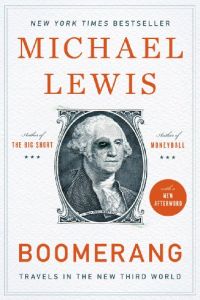Join getAbstract to access the summary!

Join getAbstract to access the summary!
Michael Lewis
Boomerang
Travels in the New Third World
W.W. Norton, 2012
What's inside?
A tour of economically beleaguered euro-zone countries suggests Americans have plenty to worry about.
Recommendation
As the euro zone grapples with the repercussions of the 2008 financial crisis – with debtor nations jockeying to end austerity and powerhouse Germany unwilling to bend – financial journalist and expert wordsmith Michael Lewis looks back to see how it all began. His 2011 tours through Iceland, Ireland, Greece and Germany throw helpful, entertaining illumination on the irresponsible – or out-and-out strange – behavior that got Europe into such a lasting jam. Lewis’s wry and highly readable travelogue hinges on individual stories and features Europeans’ memorable expressions of disgust, defiance and sheepishness. His visit to suburban California at the end of the book will disturb your sleep for months to come. There is one comfort: You will thoroughly enjoy how well Lewis writes. getAbstract recommends his bestseller to anyone concerned about the world’s future financial health. Revisit the start of the meltdown, and see how far (or not) the world economy has come.
Summary
About the Author
Michael Lewis, the best-selling author of Moneyball and Liar’s Poker, has also written for Vanity Fair, The New York Times and Slate.




















Comment on this summary